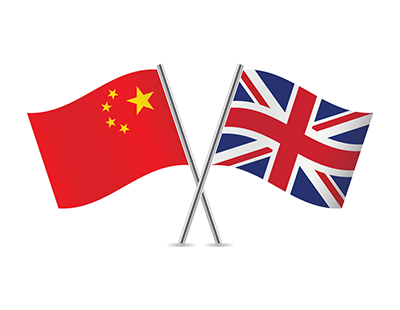“The introduction of new regulations was understandable given the soaring prices seen in some areas such as Shenzhen, that witnessed increases in premium property values of 53% in less than four years. The damping measures are working with property sales growing weaker,” Di Lieto claimed.
“The result is more investment focus on overseas property that provides better returns, with the UK being a central point of interest.”
Di Lieto says that, among China’s wealthy middle classes, there is no shortage of funds to invest.
“They currently hold more than £27 trillion in investable assets growing at an annual rate of 13%, according to a report by China Merchants Bank. By 2025, it is predicted the amount will reach £33.5 trillion,” she said.
“China’s economic growth will continue to fuel demand to invest while at the same time generate greater numbers of high-income families wanting to diversify financial portfolios abroad. Bloomberg predicts economic growth of 8.9% for this year.
“While this is not as fast as pre-pandemic levels, it is significant, and more than enough to fuel sustained demand for overseas property acquisition.
Another positive factor in maintaining Chinese interest in UK residential property is relaxation of overseas investment regulations, Di Lieto adds. She says there are significant signs that rules on savings will be loosened, with the Chinese Government giving approval in June for record amounts to be allowed out via an officially sanctioned investment quota.
“There has also been the launch of Wealth Connect, a programme that allows households in southern China to invest overseas,” Di Lieto said.
Terry Pan, chief executive officer for Greater China at Invesco, said: “Liberalisation is happening in front of our eyes. This is a very interesting time.”
Ye Haisheng, a Chinese official at the State Administration of Foreign Exchange (Safe), has said the Government is looking into whether the current $50,000 allowance for spending on travel and education could be extended to overseas investments.
Although the amount itself is not enough to have a major impact on house buying, Di Lieto says it is an important sign that Chinese authorities are relaxing financial restrictions on the outflow of money.
“Analysts predict a gradual move to liberalisation. While this is positive news in terms of opening official channels for property investment, it does not signify the closing of the options currently being used to fund Chinese buying of UK property,” she explained.
“The significance of deregulation is that it will simplify purchase and add further momentum to buying.”
Another factor in buying British housing, according to Di Lieto, is the new Non-Resident Stamp Duty Land Tax (NRSDLT).
“The new charge is not influencing Chinese buying interest. The increase in house prices of 13% during the pandemic, with new rises predicted for the future, more than offset sentiment over the 2% government levy,” she insisted.
She also claimed that some Chinese buyers will be able to avoid the tax. To do so, buyers have to remain in the UK for at least 183 continuous days in the year before purchase. Buyers can arrange buying as part of a half year stay in the UK stay, and with a high proportion of Chinese buying being for students, many families look at the potential to use university attendance as a way to circumvent the new charge.
“The high number of expat buyers will also be able to avoid the tax,” Di Lieto said, who said the new charge should also be seen in the context of the amounts set in other countries. “For example, the duty in Singapore is 20%, and in New York 15% is taken on sale alone. Many otherwise attractive locations have much higher property buying tax rates than the UK.”
Di Lieto says sellers can also look forward to a significant medium-term lift to Chinese buying. The latest report by Asian real estate technology group Juwai IQI, predicts activity will increase rapidly once international travel out of China resumes fully.
The travel trade in China believes tourist, and other international travel, will resume on a large scale in the first quarter of 2023 - not including student travel to study abroad that has already returned to normal levels.
“Still the biggest Chinese barrier to purchase in the UK comes from sellers themselves,” Di Lieto says.
“The reluctance to fully understand and communicate with Chinese buyers on their terms is a persisting trend. The majority of developers and agents opt for sales strategy based on overlaying Mandarin translations onto sales communication that works in the domestic arena, but generates little or no resonance among Chinese prospects who demand a different sales journey.
“One based on building trust, high levels of information, and assurance that is a far cry from the quick or hard sell.
She said there are a notable few developers and agents that have been prepared to learn, and tune sales strategy appropriately.
“But until the majority are prepared to commit to understanding and serving prospective buyers from China, the interest shown in buying in the UK will to a large degree, remain just potential, and sales will be lost to locations better prepared to engage with the Chinese market.
Chinese residential investment – will it be back?
Talking of the Juwai IQI report mentioned above, it aimed to analyse whether Chinese interest in residential property will bounce back now that restrictions have eased.
The report for Q3 2021 includes the latest insights on: tantalising news on Chinese capital controls, Chinese participation in UK education and the impact on property, how slower property markets in China push buyers to the UK, the UK market outlook and impact on Chinese buyers, and the impact of the non-resident stamp duty on Chinese buyers.
Georg Chmiel, Juwai IQI Group co-founder and executive chairman, said of the report: “It looks at if and how quickly Chinese demand for UK property will bounce back. Our base case is that buyer activity will rapidly increase once travel fully resumes. Buyers eager to get on with long-postponed transactions will push investment levels higher.
“After this initial rush to transact is past, transaction levels will likely fall back and resume a more sustainable level of growth.
He added: “The appetite for overseas property is increasing among Chinese consumers and investors. They are turning their eyes abroad because of increasingly restrictive local property markets in China and relatively poor prospects for economic growth.
“Chinese demand for UK property has remained remarkably stable since 2014, with the UK’s market share of Chinese buyer enquiries changing just 0.4% in that time.”
He said the UK’s world-renowned education sector is the primary driver for the stability of Chinese demand for UK property.
“Chinese households will hold US$46.3 trillion of investable assets by 2025 and have a demonstrated preference for property investment. That gives them both the means and desire for investment in the UK,” Chmiel said.
“Signs of capital controls liberalisation are tantalising for UK real estate markets. They signal the possibility that more of China’s wealth may find its way to the country in the years to come.”
He added that the UK’s strong price performance attracts buyers from China and looks likely to continue. The new non-resident stamp duty is unlikely to deter many buyers, as the UK still offers relatively affordable prices and associated costs.
“For all these reasons, the desire for UK property has not fallen, even though the pandemic has made acting on that desire more difficult. As travel resumes and obstacles fall away, we expect a resumption of Chinese buyer activity in UK markets.”








.png)










Join the conversation
Be the first to comment (please use the comment box below)
Please login to comment